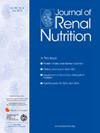Dietary Needs, Barriers, and Facilitators Among Patients on Hemodialysis and Their Caregivers: The GoodRENal Project in Spain
IF 3.2
3区 医学
Q2 NUTRITION & DIETETICS
引用次数: 0
Abstract
Objective
Dietary restrictions are common in patients undergoing hemodialysis (HD). These restrictions result in a complex diet that becomes difficult for patients to understand and to follow. Therefore, we aimed to identify dietary needs, barriers, and facilitators that influence the adherence to dietary recommendations as perceived by patients on HD and their caregivers.
Methods
Seventy-two Spanish patients on HD and 57 caregivers participated in this explorative study by replying a questionnaire consisting of 20 and 10 questions respectively. The responses were assessed using a Likert scale varying from 1 to 5 (strongly agree, agree, neither disagree or disagree, disagree, strongly disagree, respectively) to evaluate the perception of patients and caregivers regarding dietary needs, barriers, and facilitators to adhere to the recommended diet. For analysis purposes, the responses were grouped in 3 categories (agree, neither agree or disagree, disagree).
Results
Seventy percent of the patients agreed that knowing the food sources of potassium, protein and phosphate was a need for them to know to be able to adhere to the dietary recommendations. Moreover, patients stated that not being able to eat what they liked, and feeling thirsty, were important barriers. For caregivers, the support of a renal dietitian was mentioned as an important facilitator to assist those they cared for to adhere to the diet.
Conclusions
Knowing food sources of potassium, phosphate, and protein, exploring foods patients like to eat and adjusting fluid intake to avoid feeling thirsty were identified as important by the patients. These findings can be used to develop strategies and educational material to improve the dietary adherence in patients undergoing HD. Moreover, the presence of a renal dietitian was identified as an important resource by the caregivers.
血液透析患者及其护理人员的饮食需求、障碍和促进因素:西班牙 GoodRENal 项目。
目的:血液透析(HD)患者普遍存在饮食限制。这些限制导致患者饮食复杂,难以理解和遵循。因此,我们旨在确定血液透析患者及其护理人员的饮食需求,以及影响他们遵守饮食建议的障碍和促进因素:72名西班牙血液透析患者和57名护理人员参与了这项探索性研究,他们分别回答了由20个和10个问题组成的调查问卷。问卷采用 1-5 级李克特量表(分别为 "非常同意"、"同意"、"既不同意也不反对"、"不同意"、"非常不同意")进行评估,以评价患者和护理人员对饮食需求、坚持推荐饮食的障碍和促进因素的看法。为便于分析,将回答分为三类(同意、既不同意也不不反对、不同意):结果:70%的患者同意,了解钾、蛋白质和磷酸盐的食物来源是他们遵守饮食建议的必要条件。此外,患者还表示,不能吃自己喜欢的东西和感到口渴是重要的障碍。对于护理人员来说,肾脏营养师的支持被认为是帮助他们所护理的人坚持饮食的重要促进因素:患者认为,了解钾、磷酸盐和蛋白质的食物来源、探索患者喜欢吃的食物以及调整液体摄入量以避免感到口渴非常重要。这些发现可用于制定策略和编写教材,以提高接受 HD 治疗的患者的饮食依从性。此外,护理人员认为肾脏营养师的存在是一项重要资源。
本文章由计算机程序翻译,如有差异,请以英文原文为准。
求助全文
约1分钟内获得全文
求助全文
来源期刊

Journal of Renal Nutrition
医学-泌尿学与肾脏学
CiteScore
5.70
自引率
12.50%
发文量
146
审稿时长
6.7 weeks
期刊介绍:
The Journal of Renal Nutrition is devoted exclusively to renal nutrition science and renal dietetics. Its content is appropriate for nutritionists, physicians and researchers working in nephrology. Each issue contains a state-of-the-art review, original research, articles on the clinical management and education of patients, a current literature review, and nutritional analysis of food products that have clinical relevance.
 求助内容:
求助内容: 应助结果提醒方式:
应助结果提醒方式:


